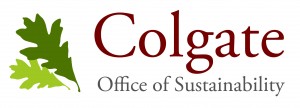By Missy Velez ’16 (Environmental Studies Major from Baltimore, MD)
 The benefit of buying local goods, mostly produce, has, of late, been questioned. This is because what the term “supporting local” means is not fully understood, and the phrase has become something in and of itself, losing its meaning. In the context of “supporting local,” it is important to keep in mind the three pillars of sustainability: economic, environmental and social. Local doesn’t need to be only segregated to the agricultural sector, and nor should it be. There are problems with the term “supporting local,” but perhaps that’s because it has been oversimplified to a bumper sticker- type slogan.
The benefit of buying local goods, mostly produce, has, of late, been questioned. This is because what the term “supporting local” means is not fully understood, and the phrase has become something in and of itself, losing its meaning. In the context of “supporting local,” it is important to keep in mind the three pillars of sustainability: economic, environmental and social. Local doesn’t need to be only segregated to the agricultural sector, and nor should it be. There are problems with the term “supporting local,” but perhaps that’s because it has been oversimplified to a bumper sticker- type slogan.
Part of the problem with the phrase “supporting local” is that is has come to mainly address buying produces from local farms, which may not actually have the environmental and health benefits that we assume it does. It has also come to conflate local farms with sustainable, organic, and small farms. Local farms can be those things, but they can also be large-scale enterprises, guilty of mistreating workers and animals and engaging in environmentally irresponsible business practices. Because of this conflation, it is no longer clear that the term “buying local” does not directly mean buying organic or buying goods from small farms. Buying from your local farm, in face of the quickly diminishing number of American farmers, can be a great thing-it helps to sustain a key part of our nation’s identity and economy. This being said, what if the farm doesn’t use sustainable practices? Yes, it’s great to be able to buy eggs from just 5 miles away, and this does mean buying local, but what if the hens are kept in cramped conditions? Sustainable interests like buying from small farms and buying from local farms can conflict with each other in the context of supporting agriculture, which contributes to the conflict surrounding what exactly “supporting local” means.
There are significant barriers to “supporting local” when you look at it from a primarily agricultural aspect. Buying local goods in an effort to support small-scale businesses and farms that struggle to compete in an increasingly globalized economy is a great part of supporting local communities. However, while buying local does fit within the idea of “supporting local,” it should not define the phrase. This ideological mix-up causes the issues related with buying local goods to cross over into the ideas behind supporting local communities, decreasing the legitimacy of the support local movement. Instead, buying local goods should be seen as an action that can be a great step to supporting local communities, but doesn’t define it.
But let’s look at supporting local at its core meaning, which is engaging with the people, businesses and lifestyles that make up our communities. It means keeping a tie with the happenings in our towns, keeping the people down the block or a few miles away in mind, and therefore keeping communities together. Supporting local doesn’t have to mean buying your Swiss chard on the Village Green, although that too has its place. Maybe it can mean telling your professor how much you enjoyed your discussion in class, saying hey to a stranger instead of avoiding their gaze as you pass them walking into town, or thanking a custodian for keeping your favorite study spot clean. Creating diverse, resilient and united communities is an essential part of increasing social sustainability, so let’s question how we can “support local” as Colgate students and, even further, as Hamilton community members.




